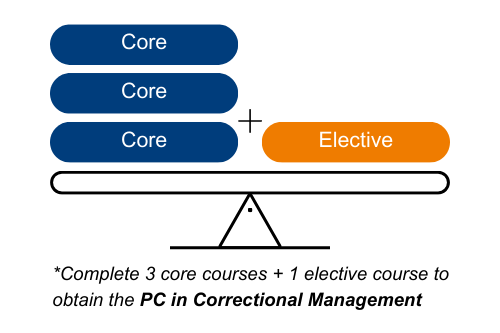Professional Certificate in Correctional Management
Registration Guide
(self-sponsored)
Applicable for self-sponsored learners who are registering for themselves.
Registration Guide
(company-sponsored)
Applicable for company-sponsored learners and HR/admin teams who are registering for their staff.
Objectives
This Professional Certificate will enable learners to:
- Appreciate the sociological rationale for punishment, and how the use of imprisonment as a penal strategy serves to deter, reform, and reintegrate the offender into society. This is accompanied by the development of skill-sets and knowledge-base of practitioners in the criminal justice system and related social control institutions, juvenile institutions, family service centres, to craft policies and programmes that will serve to prevent and deter crime, and rehabilitate and reintegrate offenders.
- Examine their relationship with their own cultural heritage and how this contributes to unconscious biases and stereotypes, as well as their effects on helping relationships. This is done through the navigation of personal level and structural level constructs to acknowledge diversity, respect differences, and recognise injustice or power dynamics to be able to break down cross cultural barriers that impede the development of effective helping relationships in the corrections setting. Participants would then be able to build rapport with service users in the corrections setting, understand the needs of different service users’ personal situations, communicate genuine concern, and empower service users through their interactions.
- Understand the larger socio-legal and ethical issues behind decision making, and increase their ethical sensitivity in the corrections setting by being able to critically identify and analyse ethical dilemmas, as well as to justify their views by applying the relevant ethical principles, laws, policies or frameworks in their everyday work with relevant stakeholders in the corrections setting.
- Use different evidence-based therapy approaches to formulate challenging cases in their line of work; to work confidently in their casework with clients and exercise flexibility in using different types of interventions. They will be familiar with different ways of formulating cases and identifying targets for intervention.
- Apply the basics of reflective practice, which allows them to safely explore and process the difficult emotions and situations encountered in corrections work, so to increase their self-confidence and reduce the feeling of burn-out when engaging in corrections work. Outcomes will be measured using The Consultation Questionnaire (Knauer et al., 2017) and the Reflective Practice Questionnaire (Rogers et al., 2019).
Target Audience and Requirements
Social workers and social service practitioners in the criminal justice system and anyone who has an interest in issues relating to crime, deviance, and criminal justice, who have:
- A degree in Psychology, Social Work, Counselling, or Sociology, or
- Relevant work experience in casework, rehabilitation work and counselling
Certificate Outline

Core Course: Process and Punishment
[23 to 24 February 2026]
Trainer: A/P Narayanan Ganapathy
At the end of the course, participants are expected to achieve the following objectives:
- Appreciate the rationale for punishment, and how the use of imprisonment as a penal strategy serves to deter, reform and reintegrate the offender into society;
- Understand how the penal system has evolved and the innovative changes being introduced to make prisons more effective and efficient;
- Appreciate new experimentations in community-corrections against the backdrop of ‘what works’ and best practices of other jurisdictions;
- Appreciate the principles that inform efficacious rehabilitation and reintegration programmes from in-care to aftercare to resettlement;
- Be introduced to some of the latest and key research works in the field of offender rehabilitation and reintegration; and
- Develop the skill-sets and knowledge-base of practitioners in the criminal justice system and related social control institutions like Boys/Girls’ Home, juvenile institutions, family service centres, to craft policies and programmes that will serve to prevent and deter crime, as well as rehabilitate and reintegrate offenders.

Core Course: Multicultural Sensitivity in Corrections
[24 to 25 March 2026]
Trainer: Mr Anson Yoo
This course will offer a construct of multicultural sensitivity in corrections work. It will focus on raising multicultural consciousness to help participants recognize and respond to cognitive biases, stereotypes and assumptions. Through experiential exercises, participants can appreciate how such responses can influence their relationships with service users and what processes are useful to these ends. Themes of oppression, discrimination, poverty and racism will be visited. The course will also develop participants’ ability to appreciate the worldviews of their service users and communicate such understanding.

Core Course: Enhancing Ethical Reasoning in Corrections
Trainer: Dr George Radics and Dr Lohsnah Jeevanandam
At the end of the course, participants are expected to achieve the following objectives:
- Understand ethical reasoning and decision-making guidelines.
- Understand how to identify ethical issues.
- Apply guidelines to relevant contexts
- Be familiar with general ethical principles.
- Learn ethical-decision making models.
- Be aware of which stakeholders to work with.

Elective Course: Incorporating Desistance-informed Theories in Offender Case Management
[23 April 2026]
Trainer: Mr Anson Yoo
At the end of the course, participants are expected to achieve the following objectives:
- Participants will appreciate the desistance paradigm in offender rehabilitation work, alongside other contemporary approaches - RNR and GLM
- Participants will develop an insight to the mechanisms of change through the lens of desistance
- Participants will also explore the relevance and application of desistance-informed practice in their own work
At the end of the course, participants are expected to be able to do the following:
- Re-evaluate their current practice in the Throughcare framework and case management in the light of desistance principles; and
- Use a Narrative practice technique in their casework conversations to balance the need for risk/needs assessment and at the same time support desistors’ sense of personal agency and enhance identity reconstruction

Elective Course: Understanding Underlying Emotions in Reintegration Work
[5 to 6 March 2026]
Trainer: Mr Benny Bong
At the end of the course, participants are expected to achieve the following objectives:
- Identify the role played by underlying emotions such as anger, shame, grief, and aggression, as a behaviour, in the lives of the addict and the family.
- Enhance the skills of clients to better manage the underlying emotions such as anger, and aggression.
- Equip participants to work with dysregulated clients (aggressive) in a safer manner.
At the end of the course, participants are expected to be able to do the following:
- Appreciate the physiological and cognitive forces at work when clients' emotions are triggered and why they act in that manner.
- Work with clients in a safe manner that avoids triggering them and helping them to deescalate.
- Teach clients ways to better self-regulate the strong emotions.
Structure of the Professional Certificate (PC) in Correctional Management

Core courses (learner to complete all three)
- Process & Punishment
- Multicultural Sensitivity in Corrections
- Enhancing Ethical Reasoning in Corrections
Elective courses (learner to choose at least one)
- Incorporating desistance-informed theories in offender case management
- Understanding Underlying Emotions in Reintegration Work
About the Instructors
A/P Narayanan Ganapathy
Department of Sociology and Anthropology,
Faculty of Arts and Social Sciences, NUS
A/P Ganapathy Narayanan is an Associate Professor in the Department of Sociology at the National University of Singapore. He is concurrently an Associate Dean at the Faculty of Arts and Social Sciences. Prof Ganapathy’s research and teaching interests are criminology, sociology of crime and deviance, sociology of law and policing, juvenile justice, criminal gangs and domestic violence.
Prof Ganapathy has published extensively in various international journals and is a member of the Editorial Boards of The European Journal of Criminology, The Asian Journal of Criminology and The International Journal of Comparative and Applied Criminal Justice. Prof Ganapathy sits on the ministerial committees of the Ministry of Home Affairs, Ministry of Social and Family Development, Ministry of Defence, and Ministry of Culture, Community and Youth. He is also a Member of the National Council Against Drug Abuse, and the Indian Community Aftercare Council.
Prof Ganapathy is the Chairman of the HEB-Ashram Halfway House, a role he undertakes in his capacity as a member of the Hindu Endowments Board.
Mr Anson Yoo
RegClinSup
Addictions and Trauma Therapist
Since 2003, Anson has assumed pastoral, clinical and leadership roles with community agencies serving desistors and persons recovering from addictions. He has headed the first halfway house running a non-faithbased programme for the moderate to high-risk group, and has developed numerous inmate/family programmes, some still currently used in the institutions.
Additionally, he runs addiction recovery support groups in the community, and provides psychotherapy and counselling services for individuals, couples and families. A notable part of his current long-term work is with men desisting from sexual offences.
Anson is committed to an attachment-focused, collaborative, systemic, trauma-informed, social justice oriented and culturally sensitive approach. Method-wise, he flexibly adopts practices from narrative, systemic, emotion-focused, cognitive-behavioural, structural dissociation, adaptive information processing and Polyvagal traditions. Trained in working with trauma and dissociation, he uses EMDR, Brainspotting, Deep Brain Reorienting (DBR) and advanced applications of the Flash Technique in trauma re-processing work. Anson believes that healing and growth only happen in relationships where persons are embraced without judgment regardless of their life experiences, and when they are supported to turn towards their pain.
Dr. George Radics
Department of Sociology and Anthropology,
Faculty of Arts and Social Sciences, NUS
Dr. George Radics received his PhD from the Department of Sociology at the National University of Singapore. He currently teaches Law in Society, Selected Topics in Law and Justice, Social Thought and Social Theory, and Sociology of Emotions. After receiving his PhD, Dr. Radics studied law at the University of Washington, where he obtained his law degree with a concentration in Asian law. Dr. Radics served as a research attorney at the Supreme Court of Guam for two years after graduating from law school. His interests are law and minorities, sociology of the law, criminal law, sociology of emotions, postcolonial studies, and Southeast Asia.
Dr. Lohsnah Jeevanandam
Department of Sociology and Anthropology,
Faculty of Arts and Social Sciences, NUS
Senior Lecturer, Director of Clinical Psychology Programme (Queensland),
BA (Hons) (Sydney)
Research interests:
- Developmental disabilities
- Dual diagnosis
- Behavioral modification
- Parenting programmes
Recent/Representative Publications:
- Jeevanandam, L. (2009). Perspectives of intellectual disability in Asia: Epidemiology, policy, and services for children and Current Opinion in Psychiatry, 22, 462-468.
- Jeevanandam, L. & Oei, T.P. (2010). Service providers working with persons with intellectual disability: Burnout, coping, self- efficacy, attitudes, and psychological well-being. LAP Lambert Academic Publishing: Germany.
Mr. Benny Bong
Director,
The Family Therapist
Mr. Bong has been a Family & Marital Therapist, Trainer and Clinical Supervisor for over thirty years. In the last 18 years, he has been in private practice, having worked in the Public Sector (Ministry of Defence, SAF Counselling Centre) and Social Services. Mr. Bong is an external lecturer with the National Institute of Education, the Executive Counselling and Training Academy (Singapore and Swinburne University), Singapore Bible College and an adjunct trainer with Social Service Institute and the Family Resource and Training Institute (Singapore). In the last few years, Mr Bong has been appointed by the Ministry of Social and Family Development as one of its Master Practice Leaders to help enhance the professionalism of the Social Service sector.

